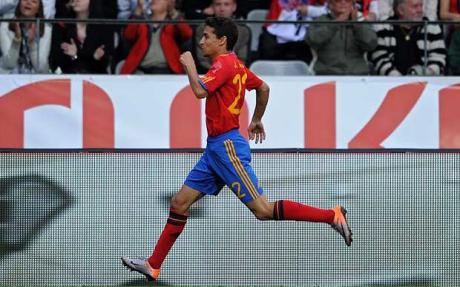

In his stride: Jesus Navas scores his first goal for Spain against South Korea
Cesc Fabregas might be the world's most wanted footballer just now, yet his relatively lowly place in the hierarchy of an utterly regal Spanish midfield also remains clear.
Thursday was Fabregas’s first match since breaking his leg while scoring a penalty against Barcelona back in March in what he now hopes will be his final act as an Arsenal player. But it was also the World Cup warm-up game that Spain manager Vicente del Bosque had clearly identified as the one in which he would rest most of his first-team.
So Fabregas duly took his place in what was effectively the reserve team and, while he is certainly pushing to replace Andres Iniesta or Sergio Busquets, Spain were a better team when he was substituted after 57 minutes by the brilliant Xavi. And, as if to underline their midfield riches, the winning goal against South Korea — a wonder strike from 25 yards — was scored by Jesus Navas Gonzalez, another player on the fringes of the team.
For Fabregas, it was an encouraging enough comeback; he looked physically strong after his nine-week lay-off and fearless in the tackle. There were also some moments of typical creativity, not least when he curled a first-half shot against the crossbar. Yet with Arsenal digging their heels in, Barcelona will be asking themselves whether they really should spent upwards of £45 million on a player who is still not sure of his international place.
The caveat, of course, is that we are talking about Spain; the clear favourites for the World Cup and a team who, in spite of this rather laboured win, are clearly at the absolute peak of their powers.
The tempo is set by Xavi and the rhythm is not dissimilar to that of Barcelona. It is a style that is based very simply on using their wonderful technical skill in possession but then a phenomenal work-rate to chase and pressurise opponents on the rare occasions they do lose the ball.
The collective anticipation could hardly be greater. “This is the best team Spain has had in their entire history,” said Emilio Butragueno, the former Spain striker. “This is a unique opportunity for Spain to win the World Cup.
There has not been a generation of players like this before and I am not sure there will be one again.” Such confidence is backed up by a truly frightening set of statistics over the past three years.
After beating England by an Iniesta goal in February 2007, Spain have gone on a run that now reads played 47, won 43, drawn three and lost one. In those games, they have also scored some 107 goals.
With Fabregas now back and del Bosque adamant that Fernando Torres will be “perfect” after his knee surgery for the opening group game against Switzerland, the real question is how Spain will cope with the psychological burden of being favourites. After all, until Euro 2008, they had a history of under-achievement in major international tournaments that surpassed even England. It is a situation that requires careful management.
“Being favourites is a terrible trap,” said Del Bosque. “There are so many variables, so many factors that can influence the eventual outcome — some of which are out of your control. The risk is creating a dichotomy in which you either win the World Cup or you’re a failure. It should not be seen as an obligation for us to win the tournament.”
Easy to say, but the reality is rather different. The Spanish squad is simply too formidable for anything less. While Spain expects, the rest of the world can do little more than hope.
- Octopus Paul v Ahmadinejad [28/07]
- France suspend entire World Cup squ [24/07]
- Webb says World Cup final was taint [23/07]
- Goal-line technology off Fifa agend [20/07]
- World Cup final ball sold for £48K [18/07]
- Evra 'is being victimised', says Fe [17/07]
- Scolari says no offer yet to coach [16/07]
- Beckham: England players must take [15/07]
- Messi says WCup loss left him with [15/07]
- Now it's Brazil's turn to get ready [15/07]
| Years | Winners | Runner-up | Third place |
| 2006 | Italy | France | Germany |
| 2002 | Brazil | Germany | Turkey |
| 1998 | France | Brazil | Croatia |
| 1994 | Brazil | Italy | Sweden |
| 1990 | Germany | Argentina | Italy |
| 1986 | Argentina | Germany | France |
| 1982 | Italy | Germany | Poland |
| 1978 | Argentina | Holland | Brazil |
| 1974 | Germany | Holland | Poland |
| 1970 | Brazil | Italy | Germany |
| 1966 | England | Germany | Portugal |
| 1962 | Brazil | Czech | Chile |
| 1958 | Brazil | Sweden | France |
| 1954 | Germany | Hungary | Austria |
| 1950 | Uruguay | Brazil | Sweden |
| 1938 | Italy | Hungary | Brazil |
| 1934 | Italy | Czech | Germany |
| 1930 | Uruguay | Argentina | America |


